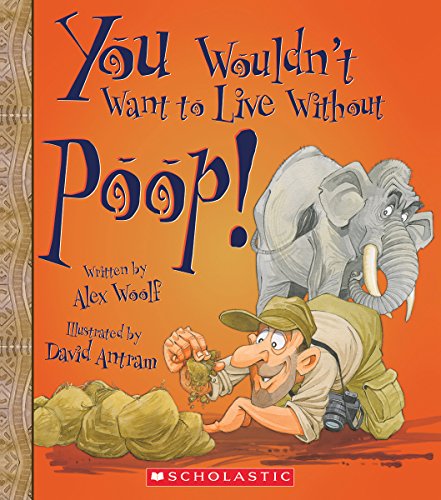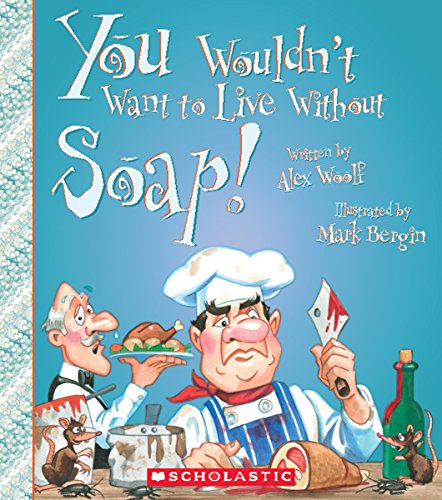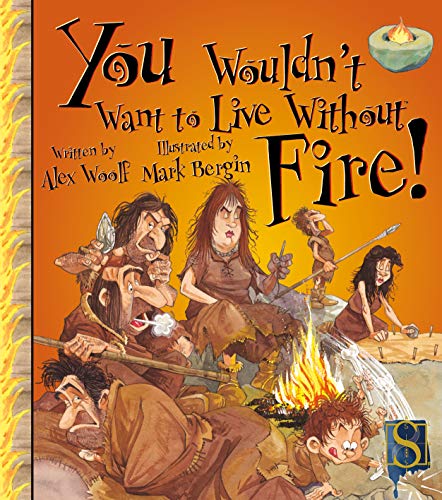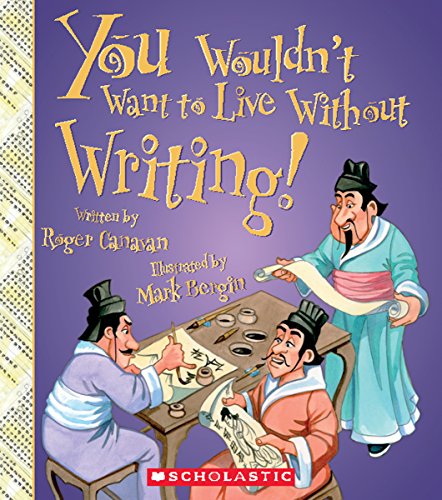-
You Wouldn't Want to Live Without Math!
Anne Rooney, Mark Bergin
Paperback (Franklin Watts, Sept. 1, 2016)Imagine how difficult life would be if you couldn't count things, measure anything, do any calculations or be precise about time, distance or price.This series takes readers (Ages 8-12) on a historical journey, examining how people coped in the past and how they developed ingenious ways to make life safer and less unpleasant. Each book features full-color cartoon-style illustrations and hilarious speech bubbles to heighten interest, making the series attractive even to reluctant readers.You might not like numbers and math when you have to do your maths homework, but it would be hard to live without them. You wouldn't know how old you are, or how long you have to wait until it's the holiday. We couldn't build anything accurately, we'd have no computers and you couldn't even go shopping. No, you wouldn't want to live without math! S
S
-
You Wouldn't Want to Live Without Writing!
Roger Canavan, Mark Bergin
Paperback (Franklin Watts, Sept. 1, 2015)What would it be like to live in a world without writing?This series takes readers (Ages 8-12) on a historical journey, examining how people coped in the past and how they developed ingenious ways to make life safer and less unpleasant. Each book features full-color cartoon-style illustrations and hilarious speech bubbles to heighten interest, making the series attractive even to reluctant readers.It is so integral to our everyday lives that you probably never stop to think. It's all around us, in the text we get from a friend, the homework we have to do after school, and our favorite book that we read at night. Like it or loathe it, writing is essential to how we communicate with each other on a daily basis. But what did people do before we developed the ability to read and write? S
S
-
You Wouldn't Want to Live Without Books!
Alex Woolf, David Antram
Paperback (Franklin Watts, Sept. 1, 2014)Can you imagine a world without books? What if writing simply didn't exist?This series takes readers (Ages 8-12) on a historical journey, examining how people coped in the past and how they developed ingenious ways to make life safer and less unpleasant. Each book features full-color cartoon-style illustrations and hilarious speech bubbles to heighten interest, making the series attractive even to reluctant readers.It might sound unbelievable, but books have actually been around for thousands of years-a lot longer than we've had paper and ink! This title in the fantastic new You Wouldn't Want to Live Without series traces the history of books from their earliest origins as clay tablets to their very latest form-the e-book. You'll learn how important they've been to our culture and civilization, and soon see why you really, really, wouldn't want to live without them. R
R
-
You Wouldn't Want to Live Without Poop!
Alex Woolf, David Antram
Paperback (Franklin Watts, Jan. 15, 2016)We all do it. We usually don't like to talk about it, but going to the toilet is a natural and necessary part of our lives.This series takes readers (Ages 8-12) on a historical journey, examining how people coped in the past and how they developed ingenious ways to make life safer and less unpleasant. Each book features full-color cartoon-style illustrations and hilarious speech bubbles to heighten interest, making the series attractive even to reluctant readers.We couldn't live without poop because there are some parts of our food that contain no nutrients that can be used by our bodies for energy, growth or health, and those parts have to be ejected. But poop can also be used to power our cars, heat our homes and help grow our crops. Learn why and how animals and people produce poop, and about the many marvellous uses for this misunderstood substance. R
R
-
You Wouldn't Want to Live Without Soap!
Alex Woolf, Mark Bergin
Paperback (Franklin Watts, Sept. 1, 2015)Would you rather put your grubby clothes in the washing machine, or take them down to the river and beat the dirt out of them?This series takes readers (Ages 8-12) on a historical journey, examining how people coped in the past and how they developed ingenious ways to make life safer and less unpleasant. Each book features full-color cartoon-style illustrations and hilarious speech bubbles to heighten interest, making the series attractive even to reluctant readers.You're lucky to have the choice! Soaps and detergents are among the great benefits of modern life. They help to keep us comfortable and save us from smelling unpleasant, but above all, they help to protect us from the germs that cause infectious diseases. Learn how soap works, how it is made, and how much harder life would be if we really did have to live without it. W
W
-
You Wouldn't Want to Live Without Bacteria!
Roger Canavan, Mark Bergin
Paperback (Franklin Watts, Feb. 1, 2015)They are far too small to be seen with the naked eye, but bacteria are one of the most widespread forms of life-and one of the oldest.This series takes readers (Ages 8-12) on a historical journey, examining how people coped in the past and how they developed ingenious ways to make life safer and less unpleasant. Each book features full-color cartoon-style illustrations and hilarious speech bubbles to heighten interest, making the series attractive even to reluctant readers. They appeared on Earth more than 3 billion years before the first dinosaurs. Some bacteria cause deadly diseases, but many are harmless or even helpful to humans and other animals. They fertilize the soil by breaking down dead material into useful chemicals, and they are an essential ingredient in many foods. Bacteria in our own bodies are a vital part of the digestive process. T
T
-
You Wouldn't Want to Live Without Coding!
Alex Woolf, David Antram
Paperback (Franklin Watts, Sept. 1, 2018)Without coding, all the computers in the world would just be useless boxes of plastic and metal. You could feed information into them, but they wouldn't know what to do with it.This series takes readers (Ages 8-12) on a historical journey, examining how people coped in the past and how they developed ingenious ways to make life safer and less unpleasant. Each book features full-color cartoon-style illustrations and hilarious speech bubbles to heighten interest, making the series attractive even to reluctant readers.Coding means creating a set of instructions (or algorithms) that tells a computer how to perform a task. Another word for coding is "programming." Learn about how much we rely on coding in our daily lives to control things such as smartphones and laptops, kitchen appliances, weather forecasts, traffic lights, heating systems, elevators, cars, and the greenhouses where our food is grown. S
S
-
You Wouldn't Want to Live Without Bees!
Alex Woolf, David Antram
Paperback (Franklin Watts, Sept. 1, 2016)What would happen if there were no bees in this world? It would be a disaster!This series takes readers (Ages 8-12) on a historical journey, examining how people coped in the past and how they developed ingenious ways to make life safer and less unpleasant. Each book features full-color cartoon-style illustrations and hilarious speech bubbles to heighten interest, making the series attractive even to reluctant readers.Without bees, we would, of course, have no honey. But we'd also lose a lot of other foods and useful products like cotton produced by plants that bees pollinate. Around half the fruit and vegetables in our supermarkets would disappear! Not only that, we would also lose the animals that eat these plants, and the animals that eat those animals! Some people are scared of bees, but there's rarely any need to be. Bees will sting in self-defence, but usually they don't disturb humans. Yet we need them. As far as important species are concerned, bees are at the top of the list - you really wouldn't want to live without them! R
R
-
You Wouldn't Want to Live Without Money!
Alex Woolf, David Antram
Paperback (Franklin Watts, Sept. 1, 2015)Learn how moneylending grew into today's banking industry, and how credit allows us to spend money we don't even have.This series takes readers (Ages 8-12) on a historical journey, examining how people coped in the past and how they developed ingenious ways to make life safer and less unpleasant. Each book features full-color cartoon-style illustrations and hilarious speech bubbles to heighten interest, making the series attractive even to reluctant readers.None of us has as much money as we would like, but imagine if money didn't exist at all. How would we buy the things we need, or sell the things we don't need? Who would decide whether a basket of fruit is worth the same as a hunting spear? Many things have been used as money, from live animals through cowrie shells to plastic cards. S
S
-
You Wouldn't Want to Live Without Fire!
Alex Woolf, Mark Bergin
eBook (The Salariya Book Company, Aug. 24, 2020)Imagine a world without fire. There would be no cooked food, no artificial light and no way of keeping warm in a cool climate. Fire can be dangerous, but over thousands of years we have learned to tame it. We use it to make pottery, glass and metals. It enabled us to invent the steam engine, the internal combustion engine and the rocket. Where would we be without it? You Wouldn’t Want to Live Without Fire! is part of a brand-new science and technology strand within the internationally acclaimed You Wouldn’t Want to Be series. The clear, engaging text and humorous illustrations bring the subject to life and stimulate young readers' curiosity about the world around them.Specially commissioned cartoon-style illustrations in full colour make these books attractive and accessible even to reluctant readers. Information is conveyed through captions, labels and humorous speech bubbles in addition to the main text. Illustrated sidebars headed ‘How It Works’, ‘Top Tip’ or ‘You Can Do It’ supply more facts, describe simple, safe experiments, or steps that readers can take to help make the world a better place. Each volume includes a timeline and a list of ‘Did You Know?’ facts.
-
You Wouldn't Want to Live Without Writing!
Roger Canavan, Mark Bergin
Library Binding (Franklin Watts, Sept. 1, 2015)What if writing never existed?It is so integral to our everyday lives that you probably never stop to think. What would it be like to live in a world without writing? It's all around us, in the text we get from a friend, the homework we have to do after school, and our favorite book that we read at night. Like it or loathe it, writing is essential to how we communicate with each other on a daily basis. But what did people do before we developed the ability to read and write? This book in the new You Wouldn't Want to Live Without series describes, in entertaining words and pictures, how we communicated before writing, why writing is so important, who first decided to write-and whether we could get by without writing. S
S
-
You Wouldn't Want to Live Without Sleep!
Jim Pipe, Mark Bergin
Paperback (Franklin Watts, Jan. 15, 2016)Most people spend a third of their life sleeping - around 25 years or more!This series takes readers (Ages 8-12) on a historical journey, examining how people coped in the past and how they developed ingenious ways to make life safer and less unpleasant. Each book features full-color cartoon-style illustrations and hilarious speech bubbles to heighten interest, making the series attractive even to reluctant readers.Like it or not, we all have to sleep. Yet sleep is also very mysterious. No one really knows why we do it. And how do we explain all those strange dreams? What scientists do understand, however, is that sleeping is essential for health and happiness. Learn about the strange sleep cycles throughout the animal kingdom, and the theories behind why people get tired or have terrifying nightmares. W
W